The words “marketing budget” are enough to stress out every marketing leader. Every dollar has to earn its place. That’s why, when budgeting season rolls around, I stock up on coffee, fire up my spreadsheets, and brace for tough decisions.
For every marketing leader, budgeting isn’t just a numbers game. It’s a high-stakes balancing act between ambition and resources.
Click here to download 8 free marketing budget templates.
In this post, I’ll show you how to make every dollar work harder, defend your budget confidently, and set your team up for success. To simplify the process, I’ve got eight battle-tested templates ready for you.
Table of Contents
.png)
8 Free Marketing Budget Templates
Free templates to manage your marketing spend across channels.
- Product marketing budget template
- Paid advertising budget template
- PR budget template
- And more!
Download Free
All fields are required.
.png)
What is a marketing budget?
As a marketing leader, I’ve found that every smart marketing strategy comes down to three key investments:
- Getting your product in front of the right people.
- Building brand awareness.
- Setting up backend systems that make scaling easier.
Nail these, and you’re not just spending — you’re investing in growth.
For example, when it comes to advertising, it’s not just about running ads. It’s about getting the most out of every dollar.
My approach? Dynamic ad content that adapts to user behavior and platform-optimized creative that outperforms generic ads. The result is higher engagement levels, better conversions, and more efficient ad spending.
Brand awareness has evolved, too. It’s no longer just about publishing blog posts or ebooks. It’s about spending strategically on multi-channel experiences that meet customers where they already are.
That means investing in podcasts, video content, and interactive resources that don’t just push content but actually build real connections.

But none of this scales without smart operational investments. Automation and SaaS tools free up budget and resources by streamlining everything from email sequences to CRM tracking to performance analytics.
AI takes it even further, optimizing ad spend, personalizing content, and delivering real-time insights that help every dollar work harder.
At the end of the day, marketing isn’t just a cost center. It’s a growth engine. When every investment works together, marketing stops being an expense and becomes a force multiplier for the business.
Marketing Budgets for Small Business
I've seen small business owners wrestle with marketing budgets, tight margins, tough calls, and the ever-present fear of wasted money.
But keeping costs lean isn’t a choice. It’s survival especially when you're scaling.
The hardest part about budgeting for your small business is balancing immediate needs with long-term growth.
Marketing fuels growth. No marketing? No sales. No sales? No business. Winning isn’t about outspending big competitors. It’s about outsmarting them.
The first step is identifying your most profitable customer acquisition channels. Double down on what works and cut the dead weight.
Ready to make your budget go further? Grab our free marketing budget templates and get started.
How much should a company spend on marketing?
While the answer depends on your industry and audience, one thing is clear: In 2025, digital advertising will make up 62.7% of global ad spending.
It’s the fastest-growing channel in advertising, and for good reason: As consumer attention shifts online, brands either follow them or risk becoming invisible. I’ve watched this shift accelerate, and it’s reshaping how companies are prioritizing their budget allocation to digital channels.
Digital ad spending spans everything from desktop ads and search engines to video platforms, social media, and mobile. These channels are evolving with new ad formats, algorithms, and user behaviors, which is reshaping engagement.
Mobile-first strategies are no longer optional; they’re essential. With mobile making up over half of all digital media consumption, brands that don’t prioritize them are becoming irrelevant.

So, how do you allocate your budget? I recommend allocating at least half to digital, if not more.
Brands winning today often allocate 60% or more to digital because that’s where consumers actually spend their time.
Don’t just stick to that number. Invest where it drives real impact.
Seeing killer results from LinkedIn? Lean in. If your brand thrives on TikTok and Instagram, double down there. Start by analyzing where you’re getting the best ROI and adjust accordingly.
So, where should the rest of your budget go? Let’s break down the smartest moves for maximum impact.
Marketing Costs
Marketing costs are all of the expenses a company incurs in order to sell, promote, develop, and market its brand. These expenses can include advertising, software and services, personnel, and content creation.
Marketing Cost Examples
After years of managing budgets (and making plenty of mistakes along the way), I've found five core areas that really move the needle: software, freelancers, personnel, advertising, and content creation.
I‘ll walk you through each one and share what I’ve learned about making smart spending decisions.
1. Software
Building a tech stack feels overwhelming. There's a free tool for everything these days, and they all promise to revolutionize your marketing.
But here's what actually works: Start with the basics that directly affect your goals. Nearly half of businesses (47%) start with Google Analytics because, well, you can‘t improve what you don’t measure.
Another 43% use Canva or similar design tools because good visuals matter, but not everyone needs the full Adobe suite on day one.
Since there’s a marketing tool for just about any task you can think of, they are generally broken down into the following categories:
- Customer relationship management (CRM).
- Online advertising.
- Social media.
- Content creation and design.
- Event marketing.
- Lead capture and lead generation.
- Marketing automation.
- Data reporting and analytics.
- Digital asset management.
- Team collaboration.
Pro tip: I've found the key is being ruthlessly practical. What problems are actually slowing your team down? Invest in those tools first. The rest can wait.

2. Freelancers
Here’s a scenario I bet sounds familiar: You’ve got a big campaign launch next week, and suddenly, your designer is swamped, your copywriter is overloaded, and your deadline isn’t moving.
That’s when I turn to freelancers, my secret weapon for getting high-quality work done quickly without overloading my team or scrambling at the last minute.
A quick tip from someone who’s learned the hard way: Set your freelance budget before you even start looking. Trust me, it’s way too easy to fall in love with a freelancer’s portfolio only to realize they’re way out of your price range.
3. New Personnel
While HR handles recruitment, you need to think bigger about how new hires fit into your marketing vision.
Here‘s what’s interesting: 70% of hiring professionals say we're facing a talent shortage, especially when it comes to finding that perfect mix of industry knowledge and soft skills.
I've learned to approach hiring with three key questions:
- What specific skills gap is holding back our marketing goals?
- How will this role evolve as our marketing strategy grows?
- What's the mix of technical expertise and emotional intelligence we need? (Fun fact: 3 in 4 hiring pros say EQ is now the most crucial skill to look for)
Pro tip: Successful hiring is about finding people who can adapt as marketing evolves. Over half of companies are moving toward skills-based hiring, focusing less on traditional requirements and more on what candidates can actually do. When budgeting for new hires, think beyond the initial investment and consider how they'll help scale your marketing efforts long-term.
4. Advertising
Here's something that took me years to learn: Creating great content is only half the battle — you need to get it in front of the right people.
With 5.5 billion people online (wild, right?), you've got to be smart about how you promote your content.
I use a pretty straightforward approach:
- Put most of your budget (70%) into what's already working. If LinkedIn ads are crushing it, don‘t fix what isn’t broken.
- Test new channels with about 20%. Maybe TikTok's your next gold mine?
- Keep 10% for unexpected opportunities. Trust me, they always pop up.
The goal isn‘t to be everywhere. It’s to be where your audience actually pays attention.
.png)
Free Advertising Planning Kit
Plan and launch an effective and profitable advertising campaign with this guide and set of templates.
- An Overview of Popular Advertising Methods
- The Pros, Cons, and Costs of Advertising Types
- A Planning Template to Outline Timeline, Budget, and Goals
- A Project Pitch Presentation Deck to Share With Stakeholders
Download Free
All fields are required.
.png)
5. Content Creation
Content marketing generates three times more leads than traditional methods, but let's be real: it also requires time and money to do well.
Budget how much money will go into creating this content so you can adjust accordingly based on its return on investment.
Now that you know what to include in your budget, let’s break down where that money actually goes.

150+ Free Content Creation Templates
Access ebook, blog post, CTA, case study, and more content templates.
- Ebook Templates
- CTA Templates
- Blog Post Templates
- And more!
Download Free
All fields are required.

Marketing Budget Breakdown
How do you divide your budget for maximum impact? Start with the 70-20-10 rule:
- 70% goes to proven strategies that already drive results.
- 20% funds new strategies designed to fuel growth.
- 10% is reserved for bold, experimental ideas.
This framework keeps your marketing steady while leaving room for innovation.
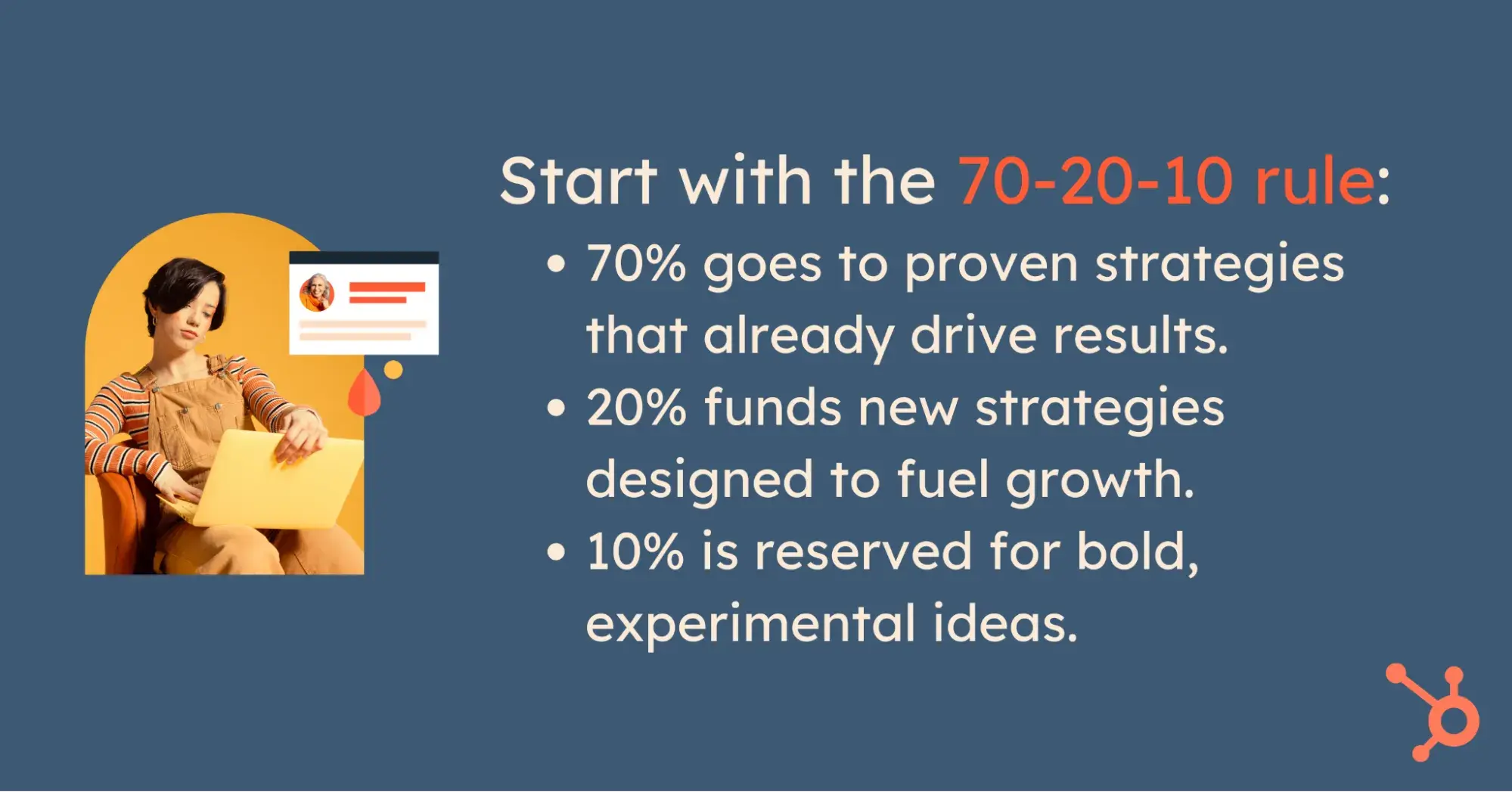
Marketing Cost Example
I've found that practical examples are often the best way to understand budget allocation. Let me walk you through how I typically recommend structuring a $10,000 marketing budget:
- Invest $7,000 (70%) in your proven channels. In my experience, this means focusing on the marketing software you rely on daily, the paid search campaigns that consistently perform well, and your established social media marketing efforts.
- Next, set aside $2,000 (20%) for growth opportunities. This is where you‘ll test marketing for new products or features. I’ve seen this approach help businesses expand their reach while managing risk.
- Finally, keep $1,000 (10%) for experimentation. This is your chance to try sponsored content or emerging marketing channels that could give you an edge over competitors.
Allocation by Channel
While I love the 70-20-10 framework as a starting point, I always look at broader industry patterns to sense-check our strategy. The latest Gartner research has revealed some fascinating trends in how CMOs are investing their 2024 budgets.
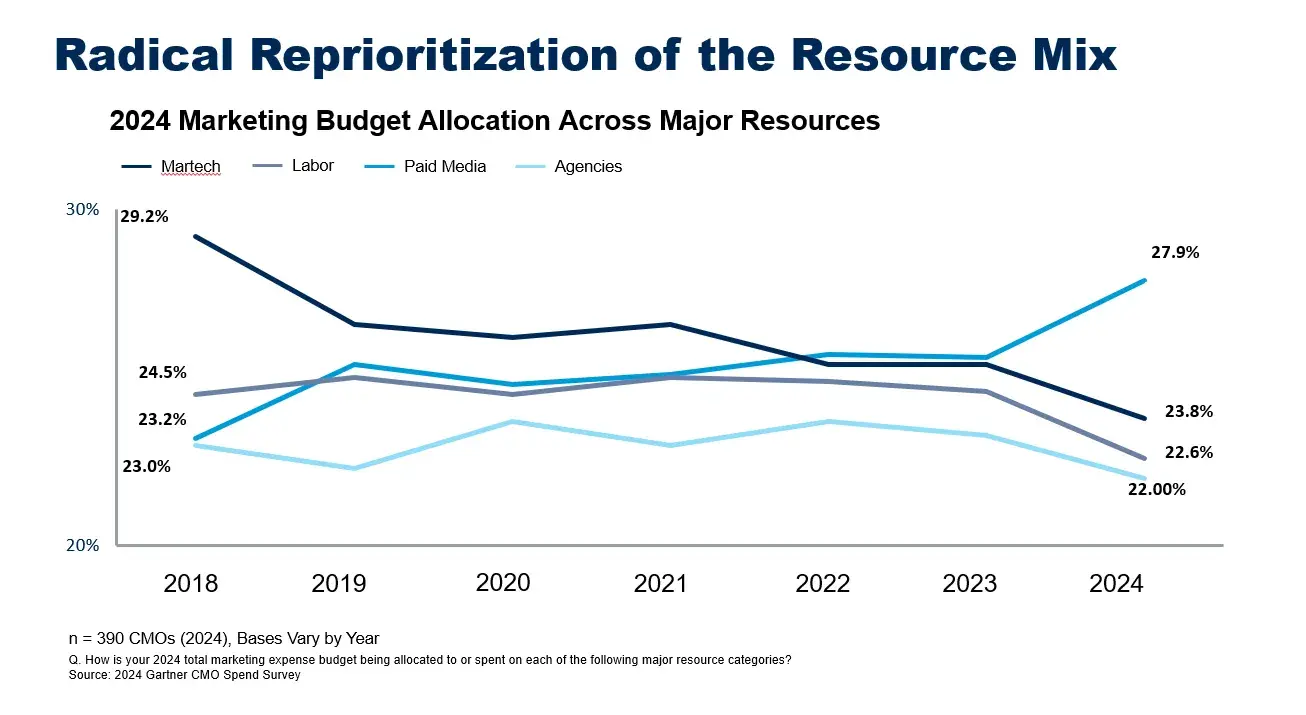
Here‘s what I’m seeing: Digital channels now take 57.1% of paid media spend, with investments breaking down like this:
- Search advertising leads at 13.6% (I‘m not surprised. It’s still one of our most reliable channels)
- Social advertising follows at 12.2% (and growing steadily, in my experience)
- Digital display holds strong at 10.7%
But don‘t count out traditional channels. They’re still powerhouses:
- Event marketing: 17.1% (I've seen incredible ROI from well-executed events)
- Sponsorships: 16.4%
- Television: 16%
The scale of marketing investment keeps growing. We're looking at $1 trillion in 2025, with $750 billion going to digital ads.
But here‘s an interesting insight I’ve noticed: while CMOs rank digital video/streaming as their most effective channel, it does not receive the top budget allocation. In my experience, this often signals an opportunity. Sometimes, the highest-impact channels aren't the most obvious ones.
Let‘s dive into how these trends translate into practical budget decisions for each major marketing channel. I’ll share what I've seen work best across different scenarios.
Paid Search Advertising
I've found that successful PPC budget management goes well beyond creating and running ads on Google and basic bid optimization. When I structure search budgets, I focus on strategic allocation across the full funnel.
While bottom-funnel conversion campaigns often command the largest share, maintain a 15-20% for brand protection and competitor terms. This balance has consistently helped my clients maintain market position while driving growth.
Cost management in paid search requires a nuanced approach. In my experience, tracking your CPC: Customer Lifetime Value ratio by campaign type gives you the clearest picture of scalability.
I use Google's keyword planner for initial research, but I‘ve learned that actual performance data is your best guide for budget optimization. Even with a set budget of $2,000, you may only generate $1,500 in clicks, which I’ve found is often a sign you need to refine targeting rather than just increase spending.
Here's how I approach PPC budget allocation:
- Map campaign types to business objectives.
- Set performance thresholds by campaign category.
- Monitor impression share against budget caps.
- Adjust based on quality score impact on efficiency.
Social Media
When building social media budgets, I always start with the strategic fundamentals. Like PPC, social platforms use auction systems for ad delivery, but I've found that success depends more on sophisticated audience targeting than pure bid strategy.
From my experience working with various team structures, I have learned that there are two main options:
- Build an in-house team.
- Partner with an agency.
Agency partnerships typically cost between $2,000 and $20,000 monthly, but I've learned to look beyond the retainer. The best agencies usually maintain a 30/70 split between strategy and execution, a ratio that consistently drives stronger results.
Here's the framework I use when deciding between in-house and agency approaches:
- Strategic control requirements.
- Platform complexity and specialization needs.
- Creative production scale.
- Performance analysis depth.
Content Marketing
I break content marketing investments into four core areas.
- Strategy and planning (15-20%): This is your foundation. I invest in content architecture, audience research, and comprehensive topic mapping. I've found that companies who skimp here often end up with content that drives traffic but fails to convert.
- Creation and production (35-40%): This typically requires the largest allocation. It covers development, editing, design, and multimedia production. I recommend balancing investment between cornerstone content that builds authority and tactical content that drives conversions.
- Distribution and amplification (25-30%): Many organizations underspend here. I allocate a significant budget to paid promotion, strategic partnerships, and syndication. In my experience, even exceptional content needs strategic amplification to deliver ROI.
- Performance optimization (15-20%): This is crucial for sustainable success. I ensure resources for analytics, testing, and regular content refreshes. I've seen strategic optimization double or triple content performance within months.
Content marketing costs vary widely based on your goals and area of focus. Hiring outside consultants or agencies to handle content marketing for you can range from $2,000 to $10,000 per month for small to medium-sized businesses.
When advising on resource allocation between in-house teams and agencies, I evaluate several factors:
- Required content velocity and complexity.
- Specialized expertise needs.
- Distribution channel mix.
- Measurement capabilities.
For ROI tracking, I recommend focusing on three key dimensions:
- Direct revenue impact through lead generation and conversions.
- Brand authority building via a share of voice and audience growth.
- Operational efficiency improvements in sales and support.
Here‘s a key insight from my experience: Most struggling content programs aren’t failing due to content quality — they're failing due to improper resource allocation across these areas.
Pro tip: I track these metrics using HubSpot's campaign budget management system, which helps me monitor performance across channels while maintaining a clear view of our overall marketing spend distribution.
Email Marketing
While analyzing channel performance, I‘ve found email marketing’s reputation for high ROI is well-deserved.
But there's a catch.
While it delivers acquisition rates 40x higher than Facebook and X combined, this performance depends entirely on strategic investment in the right areas.
Let me share how I structure email marketing budgets for maximum impact. I break it down into these four core components:
- First, there's your technology stack (15-25% of budget). This isn‘t just your ESP. I recommend including automation tools, testing platforms, and critical integrations. I’ve seen too many companies underinvest here and limit their program's potential.
- Next comes strategy and planning (20-30%). This covers segmentation development, journey mapping, and integration planning. When I audit struggling email programs, weak strategy is often the culprit.
- Content creation typically requires the largest allocation (30-40%). This includes campaigns, nurture flows, and transactional emails. Success correlates directly with content personalization capabilities.
- Finally, never skimp on analytics and optimization (15-25%). In my experience, robust testing and optimization processes often double or triple program performance within the first year.
For companies weighing agency partnerships versus in-house development, I evaluate three factors:
- Technical complexity of required automation.
- Volume and sophistication of required content.
- Internal resource availability and expertise.
The right choice depends on your specific situation. For instance, I often recommend agencies for complex automation needs but suggest building in-house teams when content volume is the primary driver.
.png)
8 Free Marketing Budget Templates
Free templates to manage your marketing spend across channels.
- Product marketing budget template
- Paid advertising budget template
- PR budget template
- And more!
Download Free
All fields are required.
.png)
Search Engine Optimization
Effective SEO investment depends heavily on your SEO maturity stage. I categorize this into three levels: foundational (technical optimization), growth (content authority building), and competitive advantage (market leadership).
Here’s how I structure SEO budgets for maximum impact across these stages:
- Technical Infrastructure (20-30%): I start with the foundation. This covers site architecture, speed optimization, and indexation management. I've seen too many companies underinvest here, only to face costly fixes later. When I audit struggling SEO programs, technical debt is often the hidden performance killer.
- Content Development (30-40%): This typically requires the largest allocation. It includes strategic content creation, on-page optimization, and regular content refreshes. I've found that sustainable SEO success correlates directly with consistent, high-quality content investment.
- Authority Building (20-25%): This is where I focus on digital PR, strategic partnerships, and targeted outreach. The key here is quality over quantity. I've seen better results from five relevant, authoritative links than fifty mediocre ones.
- Analytics and Strategy (15-20%): Never underestimate the value of robust tracking and analysis. I always ensure budgets include resources for advanced analytics, competitive analysis, and opportunity identification. This often reveals high-ROI opportunities others miss.
When advising clients on agency partnerships versus in-house teams, I evaluate several factors:
- Existing technical debt and resolution complexity.
- Required content volume and expertise.
- Competitive landscape intensity.
- Internal team capabilities.
For measurement, I recommend looking beyond basic traffic metrics. Focus on:
- Revenue contribution by content type.
- Customer acquisition costs compared to other channels.
- Brand search volume trends.
- Market share of search metrics.
How to Create a Marketing Budget
- Know your buyer's journey.
- Align your budget with your marketing goals.
- Beware of hidden marketing costs.
- Remember where your priorities lie.
- Spend your budget smartly.
- Prepare to measure ROI.
Spreadsheet knowledge alone won‘t help you understand how you’ll spend your marketing money this year. Creating a sound marketing budget starts with knowing what purpose this budget will serve and which marketing teams it will represent.
Here’s how I approach creating a marketing budget.
1. Know your buyer's journey.
Your buyer’s journey consists of the steps your audience takes to go from prospect to paying customer.
By mapping out your buyer’s journey, you can see how your audience interacts with your marketing at each stage. This helps you sharpen your goals and spend your budget where it matters most.
I always ask myself these questions as I define my buyer's journey:
- How do leads and customers typically discover my products?
- What information do they need before making a purchase?
- How many site visits does my website receive each month?
- How many leads do we generate per month, and what percentage convert to paying customers?
- How much does it cost to acquire and convert new leads?
- What is the average revenue per lead?
Defining my buyer’s journey helps me identify what’s working, fix what’s not, and focus my budget where it counts.
2. Align your budget with your marketing goals.
Your marketing spend — how much and where — depends entirely on your goals.
So, when creating your marketing budget, make sure you only fund initiatives that align with your current goals, which are based on your audience’s journey from prospect to customer.
These might include:
- Display ads to promote a new product you're launching this year.
- Sponsored social media posts to grow your new Facebook page’s following.
- Paid search engine ads to drive traffic (and purchases) to a specific product page.
- Hiring contract bloggers to boost organic search traffic to your company's website.
I've seen budgets stretch (and break) depending on whether the focus is lead generation or lead conversion.
Jessica Webb Kennedy, formerly a demand generation marketer at HubSpot, now product marketing manager at Jasper, breaks this down.
“Most of the money you spend on paid efforts is usually calculated based on the volume of clicks or impressions. Because of this, you'll often want to allocate more budget to campaigns with broader audiences and high-engagement offers,” Kennedy says.
For example, she explains, a tweet or Facebook ad promoting a top-of-funnel lead generation offer will likely attract more clicks than a mid- or bottom-funnel campaign.
Your paid advertising costs will also shift depending on how wide of an audience you're targeting.
“You can look at Twitter advertising as an example,” Webb says.
“You have the option to target your campaigns based on users' interests or keywords searched for. Interests are a much broader category, whereas smaller pockets of users are searching for any given keyword. So, your interest-based audience is going to be much larger and require a larger budget,” she adds.
I've seen this play out firsthand. Targeting a broad audience, such as interest-based segments, requires a larger budget because it reaches more people. In contrast, keyword-based targeting focuses on a smaller, highly specific group, offering potentially greater relevance at a lower reach.
At the end of the day, your marketing dollars should work for your goals. Spend wisely.
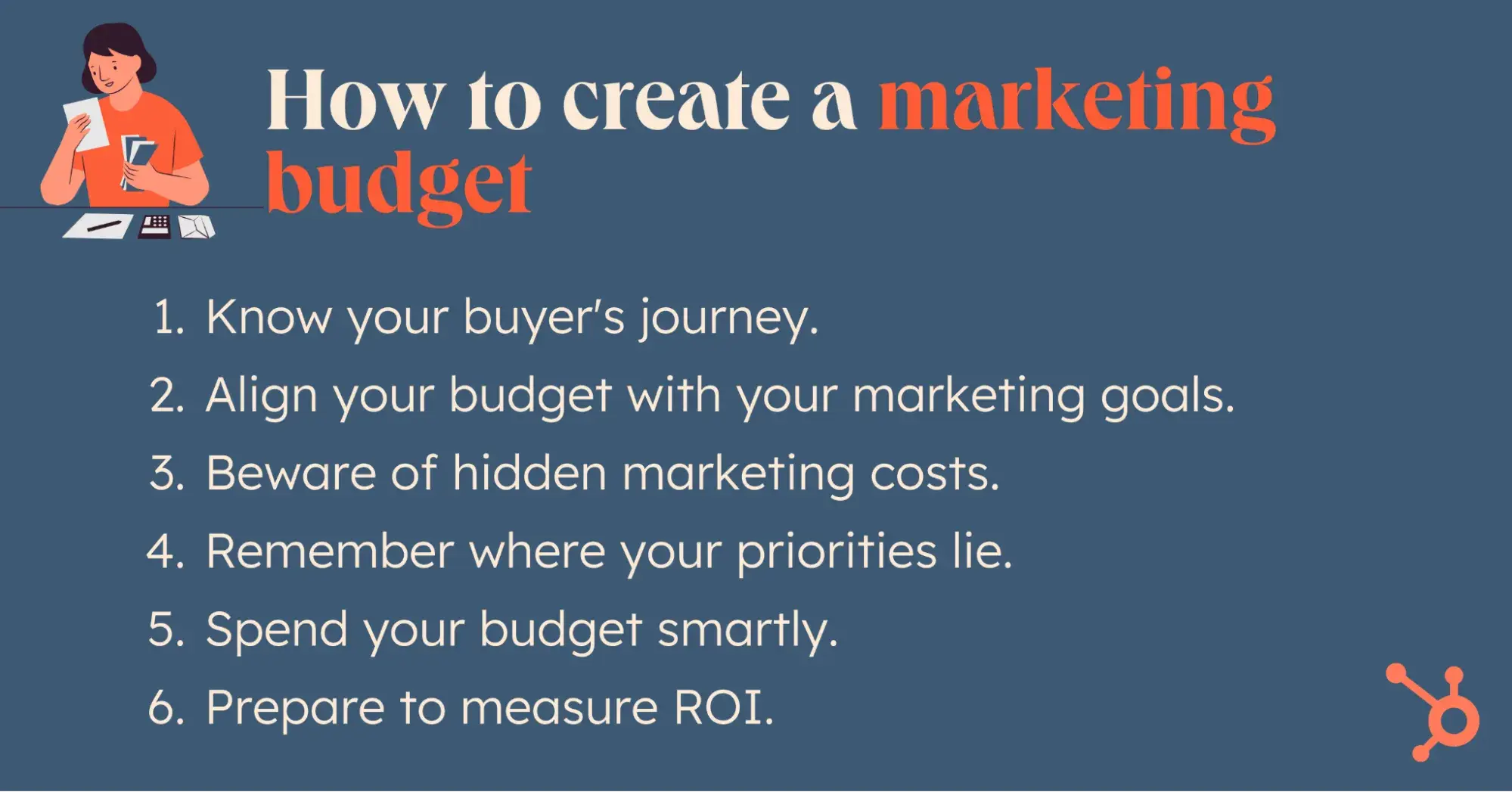
3. Beware of hidden marketing costs.
A well-maintained budget spreadsheet prevents those end-of-quarter or end-of-year freak-outs when you realize, “Whoa … what did I spend all that money on?”
I’ve seen it happen. Overlooked expenses sneak up and suddenly, marketers are scrambling to cover unexpected costs. Product marketing, in particular, is one of those areas where budgeting oversights can lead to serious surprises.
Meghan Keaney Anderson, former HubSpot VP of marketing, now head of product marketing at Watershed, points out that marketers often forget about key costs beyond just promotion.
“People often budget for product marketing with only launches and promotions in mind,” Anderson explains.
But successful product marketing isn’t just about the big splash. It requires investing in research and message testing well before launch.
“Talking to customers early about their pain points sharpens messaging and paves the way for a powerful launch,” Anderson says.
4. Remember where your priorities lie.
Marketing is full of add-ons, upsells, and “premium” versions, but how many are actually worth the price? The best way to find out is to track every expense.
I monitor my budget closely and match every dollar spent to the results I’m getting. When you know exactly where your money is going, it’s easier to focus on what’s working and cut the rest without second-guessing.
Take public relations, for example. It’s a field packed with budget-draining tools, which makes smart spending even more critical. You might be splurging on flashy distribution software while underinvesting in media relationships that would move the needle.
There are plenty of tools “to help PR pros create and distribute content, target key stakeholders, and measure reach and effectiveness,” says Nathaniel Eberle, former PR director at HubSpot and now VP of global brand at GoTo.
Before spending money on PR tools, teams need to determine which journalists, influencers, or decision-makers they need to reach and then budget accordingly.
“As the media and digital landscape evolves at breakneck speed, continually reassessing the tools, services, and programs you’re using is key to understanding the real-time ROI of your spend. Today’s must-have tool may be worthless tomorrow,” Eberle adds.
The PR landscape moves fast. If you’re not constantly re-evaluating your tools and spending, you’re probably wasting money.
5. Spend your budget smartly.
When you open these marketing budget templates and check out all the various expenses detailed in them, don’t fret if you can’t tick every box.
I'm not advocating for an “always spend more” approach to marketing. I’m advocating for an “always spend smart” approach. The expenses listed aren’t mandatory.
They’re just meant to guide your thinking and to help ensure that you haven’t overlooked any hidden costs.
6. Prepare to measure ROI.
When I put a certain amount of money into a certain area, I want to determine if my budgeting helped or hurt me as I plan out future budgets. The best way to do this is by measuring ROI.
If the money I’ve spent on one item results in my company making more in return, I may want to increase the budget in the next year. If my money doesn’t end in a positive ROI, I re-examine my budget.
.png)
8 Free Marketing Budget Templates
Free templates to manage your marketing spend across channels.
- Product marketing budget template
- Paid advertising budget template
- PR budget template
- And more!
Download Free
All fields are required.
.png)
Marketing Budget Templates
It can feel overwhelming when you’re unsure how to split or track your spending. I’ve been there. But here’s the good news: these marketing budget templates can help to take the guesswork out of budgeting. I know how much easier budgeting becomes when you have the right tools in place.
Whether I’m tracking content spending, paid ads, or event costs, these templates — available in both Excel and Googe Sheets — give me clarity and control over my marketing budget so I can manage everything at a monthly and quarterly level.
Let’s dive in and see how these templates can simplify your planning and tracking.
1. Master Marketing Budget Template
Free Download: Master Marketing Budget Template
While it’s helpful to have individual budget templates for specific marketing departments and activities, it’s also nice to be able to take a step back and see the bigger picture.
The Master Marketing Budget Template lets you do just that: It's the place where you can collect the totals from the other seven templates in the bundle and see all of your expenses in one place.
- Budget overview from all departments: In the first table, you get to see both your budget and actual spending from all marketing departments, including product marketing, content marketing, paid advertising, PR, branding and creative, and events.
- Month-over-month expense summary: For a more bird’s eye view of all expenses, look at this table, where you can see the aggregated budget and actual spending for all marketing activities.
- Marketing budget vs. actual spend chart: This chart allows you to pinpoint trends in spending and budgeting — where you came under and where you overspent.
2. Product Marketing Budget Template
Free Download: Product Marketing Budget Template
This template will guide you step-by-step through the process of budgeting for a product launch.
From determining product/market fit to running user testing sessions to promoting your finished product, our Product Marketing Budget Template will help ensure you don't overlook any important expenses.
- Budget and spend per product marketing activity: This table allows you to set a budget and track your spending for product marketing activities such as carrying out focus groups, hosting launch events, and creating white papers.
- Year-to-date summary of categorical expenses: Here, you can see an aggregated summary of all expenses divided by category, such as product release spending and product testing. It will also automatically calculate the amount of money you have left.
- Year-to-date summary chart: This chart allows you to see a visual breakdown of where most of your funds are going, which is immensely helpful for figuring out where to scale back and where to invest more.
3. Content Budget Template
Free Download: Content Budget Template
The budget required for creating and promoting content can vary greatly from organization to organization.
For example, while some organizations keep most of their content operations in-house, others rely more heavily on freelancers and contractors.
And while some use many different software products, publishing tools, and services, others take a much simpler approach.
- Budget and spend per content marketing activity: This table allows you to set a budget and track spending for content marketing activities, such as purchasing design software, creating landing pages, and hiring freelance writers
- Year-to-date summary of categorical expenses: Here, you can see an aggregated summary of all expenses divided by category, such as software purchases and freelancer costs. It will also automatically calculate the amount of money you have left.
- Year-to-date summary chart: This chart allows you to see a visual breakdown of where most of your funds are going, which is immensely helpful for figuring out where to scale back and where to invest more.
This is designed to cover as many content-related bases as possible. So, if you see any expenses listed that don‘t apply to your organization, go ahead and delete them. (That’s the beauty of Excel spreadsheets: You can customize them to your specific needs.)
4. Paid Advertising Budget Template
Free Download: Paid Advertising Budget Template
Paid advertising: Does it really qualify as an inbound marketing tactic/channel? That is a loaded question, my friends, and one that I don't have room to answer in-depth in this post.
What I can tell you for sure is that you can do paid advertising in an “inbound” way — i.e., by targeting specific buyer personas and using paid advertising as a supplement to your organic efforts to help drive awareness and conversion opportunities.
Measuring the effectiveness of your paid advertising campaigns is also paramount to doing things the inbound way.
Using our Paid Advertising Budget Template, you can keep tabs on your monthly (and quarterly) ad spending and then cross-reference the amounts with your lead-generation metrics to determine your cost-per-lead.
- Budget and spend per paid advertising activity: This table allows you to set a budget and track spending for paid advertising activities, such as launching CPC campaigns, creating social media ads, and investing in a content discovery platform.
- Year-to-date summary of categorical expenses: Here, you can see an aggregated summary of all expenses divided by category, such as search advertising and lead generation. It will also automatically calculate the amount of money you have left.
- Year-to-date summary chart: This chart allows you to see a visual breakdown of where most of your funds are going, which is immensely helpful for figuring out where to scale back and where to invest more.
5. Public Relations Budget Template
Free Download: Public Relations Budget Template
Public relations expenses amount to more than just paying for press releases. From reputation monitoring software to traveling (e.g., to events and trade shows) to applying for awards, there are many PR costs that can be all too easy to overlook.
To ensure you’re accounting for all of your organization’s PR-related expenses, check out our Public Relations Budget Template.
- Budget and spend per public relations activity: This table allows you to set a budget and track spending for PR activities, such as purchasing a press release service subscription, creating PR content, and hosting PR dinners.
- Year-to-date summary of categorical expenses: Here, you can see an aggregated summary of all expenses divided by category, such as subscriptions, content, tradeshows, and media relations. It will also automatically calculate the amount of money you have left.
- Year-to-date summary chart: This chart allows you to see a visual breakdown of where most of your funds are going, which is immensely helpful for figuring out where to scale back and where to invest more.
6. Branding and Creative Budget Template
Free Download: Branding and Creative Budget Template
In order to produce high-quality, innovative graphics, videos, and other content, the branding and creative teams of today need more than just Photoshop ... a lot more.
One of the largest — and often most overlooked — expenses is: storage.
If your organization is producing a lot of video, storage is especially important. Because as it turns out, when budgeting for video storage, you shouldn't be thinking on a megabyte (MB) or even a gigabyte (GB) scale, but on a terabyte (TB) scale. FYI: 1 terabyte = 1 trillion bytes.
You can keep track of all your storage costs (and other branding and creative costs) using our free template.
- Budget and spend per branding and creative activity: This table allows you to set a budget and track spending for branding and creative activities, such as purchasing creative software, investing in hardware, and renting equipment.
- Year-to-date summary of categorical expenses: Here, you can see an aggregated summary of all expenses divided by category, such as software subscriptions, equipment rentals, and outsourcing costs. It will also automatically calculate the amount of money you have left.
- Year-to-date summary chart: This chart allows you to see a visual breakdown of where most of your funds are going, which is immensely helpful for figuring out where to scale back and where to invest more.
7. Website Redesign Budget Template
Free Download: Website Redesign Budget Template
Budgeting for a website redesign can be seriously tricky. With so many moving pieces to consider, there is a lot of room for underestimating or miscalculating costs.
We created our Website Redesign Budget Template so you can keep all of your redesign-related expenses in one convenient location. (Unsure if your current website is right for a redesign? Grade your website using this tool.)
- Budget and spend per website redesign activity: This table allows you to set a budget and track spending for website redesign activities, such as purchasing a domain name, investing in CMS software, and creating wireframes.
- Year-to-date summary of categorical expenses: Here, you can see an aggregated summary of all expenses divided by category, such as software, content and design, and content migration. It will also automatically calculate the amount of money you have left.
- Website redesign “Actual cost by category” pie chart: This chart allows you to see a percentage breakdown of where most of your funds are going, which is immensely helpful for figuring out where to scale back and where to invest more.
8. Event Budget Template
Free Download: Event Budget Template
When planning an event, the associated costs can seem obvious at first. There’s the venue to consider, of course. And the P.A. system and microphones. And then, the costs associated with booking and bringing in presenters/performers.
That’s pretty much it, right? Wrong.
For example, does the venue come with tables/chairs, or will you have to rent those separately? Do you want your attendees to wear name tags, and if so, will you be printing out the name tags ahead of time or will attendees be writing their own names on blank tags?
If the latter, have you factored in the pens or markers you'll need to accommodate that? As you can see, planning for an event can lead you down many rabbit holes.
Use our Event Budget Template to stay organized.
- Budget and spend per event hosting activity: This table allows you to set a budget and track spending for event hosting activities, such as renting an event hall, purchasing food and drinks, and hiring presenters.
- Year-to-date summary of categorical expenses: Here, you can see an aggregated summary of all expenses divided by category, such as revenue, refreshments, and promotion. It will also automatically calculate the amount of money you have left.
- Event “Actual cost by category” pie chart: This chart shows a percentage breakdown of where most of your funds are going, which is immensely helpful for determining where to scale back and where to invest more.
Sample Marketing Budgets
How much should you actually spend on marketing in 2025? With marketing budgets averaging 7.7% of revenue in 2024, every dollar has to work hard. But what’s the best way to allocate it?
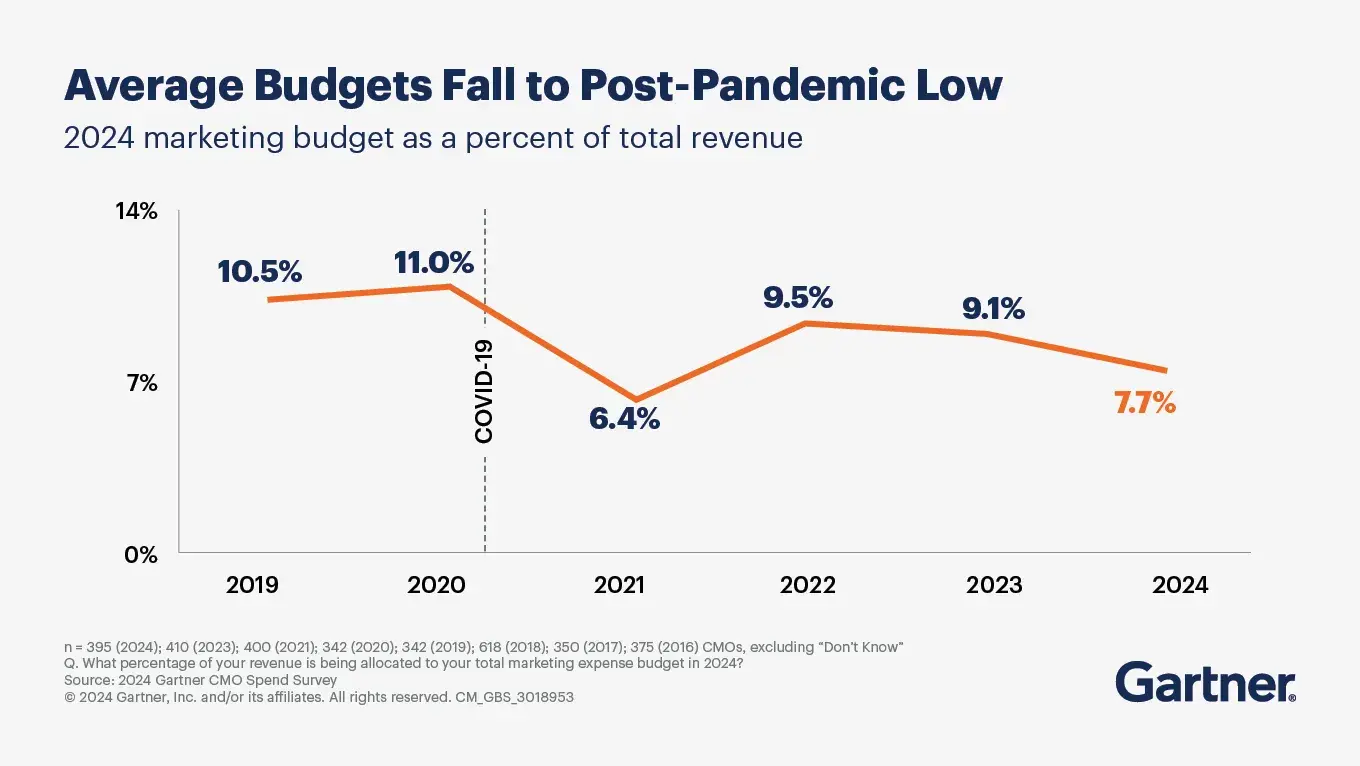
Based on the downward trend of post-pandemic marketing budgets, I’ve broken down how different industries might structure their marketing spending and what that means for your strategy. Each budget reflects how each type of business makes money and what it needs to prioritize to grow.
Early-Stage SaaS Startup
- Annual Revenue: $2M
- Marketing Budget (7.7%): $154,000
Quarterly Breakdown
- Digital Advertising (35%): $13,475
- Search ads: $7,000 (focused on high-intent keywords)
- Social media ads: $4,475 (primarily LinkedIn and Meta)
- Display ads: $2,000 (retargeting campaigns)
- Content Marketing (25%): $9,625
- Sales Enablement (20%): $7,700 (tools, collateral, and training to help sales teams convert leads efficiently — critical for SaaS companies with long sales cycles)
- Events/PR (15%): $5,775
- Testing New Channels (5%): $1,925 (exploring emerging platforms and new acquisition strategies)
What I Like
I like how this budget prioritizes demand generation which is exactly what an early-stage SaaS startup needs.
35% of the budget goes to digital ads because acquiring customers fast is key. The search ad spend of $7,000 makes sense since SaaS thrives on high-intent keywords that target buyers actively looking for solutions.
I also appreciate the 25% for content marketing because SaaS has long sales cycles, and content helps educate and nurture leads over time.
The 20% for sales enablement is a smart move, too, since SaaS sales require strong collateral and training to help reps close deals.
Finally, I love that 5% is set aside for testing new channels. Startups don’t always know which platform will scale best, so keeping a small but dedicated budget for experimentation is a smart way to stay ahead of trends.
.png)
8 Free Marketing Budget Templates
Free templates to manage your marketing spend across channels.
- Product marketing budget template
- Paid advertising budget template
- PR budget template
- And more!
Download Free
All fields are required.
.png)
Established Ecommerce Business
Annual Revenue: $10M
Marketing Budget (7.7%): $770,000
Quarterly Breakdown
- Performance Marketing (40%): $77,000
- Search advertising: $25,000
- Social media ads: $30,000
- Shopping ads: $22,000
- Email Marketing (25%): $48,125 (retention, abandoned cart recovery, and lifecycle automation)
- Content and SEO (20%): $38,500
- Brand Awareness (10%): $19,250
- Experimental Channels (5%): $9,625
What I Like
I like how this budget leans heavily into performance marketing (40%) because ecommerce is all about scaling fast and converting traffic. The split between search, social, and shopping ads ensures a diversified ad strategy, which reduces risk.
The 25% for email marketing is something I really appreciate. Too many ecommerce brands overspend on ads and forget that email marketing delivers some of the highest ROI. A strong investment here ensures brands can maximize lifetime value, recover abandoned carts, and create repeat buyers.
I also like the 20% for content and SEO. It tells me the brand isn’t just relying on ads but also building sustainable, long-term traffic through organic search. That’s a critical move as ad costs continue to rise.
Professional Services Firm
Annual Revenue: $5M
Marketing Budget (7.7%): $385,000
Quarterly Breakdown
- Lead Generation (30%): $28,875 (targeted outreach, inbound strategies, and conversion optimization)
- Content Marketing (25%): $24,062
- Event Marketing (20%): $19,250
- Digital Presence (15%): $14,437
- Brand Building (10%): $9,625
What I Like
I like how lead generation gets the largest share (30%) because in professional services, you don’t win clients through impulse purchases you build relationships. The focus on targeted outreach and inbound strategies tells me this budget is structured for high-value lead conversion, not just volume.
I also appreciate the 25% investment in content marketing because expertise is what sells in this industry. Whitepapers, webinars, and thought leadership all establish trust and authority.
The 20% for event marketing also makes sense. This industry still relies heavily on networking and in-person relationships.
Events are where firms can connect with high-value clients and close deals, so this budget reflects how sales actually happen in professional services.
Direct-to-Consumer (D2C) Brand
Annual Revenue: $20M
Marketing Budget (7.7%): $1.54M
Quarterly Breakdown
- Social Media Advertising (35%): $134,750
- Influencer Marketing (25%): $96,250
- Content Creation (20%): $77,000
- Email Marketing (15%): $57,750
- Customer Research (5%): $19,250
What I Like
I like how 35% of the budget goes to social media advertising because that’s the backbone of D2C growth. Social ads allow for precise targeting, quick testing, and scalable acquisition.
The 25% for influencer marketing is also a smart investment. D2C buyers rely on trusted voices and social proof, so this ensures a mix of organic trust-building and paid amplification.
I also love the 20% for content creation. With social platforms prioritizing engaging content, a D2C brand can’t afford weak creative. This budget ensures high-quality visuals, UGC, and video production.
B2B Manufacturing Company
Annual Revenue: $50M
Marketing Budget (7.7%): $3.85M
Quarterly Breakdown
- Trade Shows and Events (30%): $288,750
- Digital Marketing (25%): $240,625
- Sales Support (20%): $192,500
- Account-Based Marketing (15%): $144,375
- Market Research (10%): $96,250
What I Like
I like how trade shows and events take up 30% of the budget because that’s how major B2B deals get made. Face-to-face networking is still essential in this industry, and this budget reflects that.
The 25% allocated to digital marketing is also a smart move. Historically, manufacturing companies have underinvested in digital, so this ensures paid search, SEO, and content marketing help generate inbound leads.
I also appreciate the 15% investment in account-based marketing (ABM). B2B sales require targeting specific high-value accounts, so this allocation ensures marketing efforts are aligned with sales to drive large deals.
Marketing Budget vs. Advertising Budget
In my experience, one of the most common points of confusion I encounter is the difference between marketing and advertising budgets. While both aim to capture consumer interest and increase sales, they serve distinct purposes in your overall strategy.
Marketing budgets cover the entire customer journey. When I create a marketing budget, I plan for everything from market research and brand development to customer retention and analytics tools.
It's like planning for an entire house, including the foundation, rooms, and all the furnishings that make it functional.
Advertising budgets, on the other hand, focus specifically on creating awareness and engaging customers through paid channels.
Think of it as your megaphone: the tools and platforms you'll use to amplify your message. In my budget planning, advertising typically falls under the larger umbrella of marketing, much like how your living room furniture falls under your overall home improvement budget.

While ad budgets often represent the largest portion of marketing budgets (I typically see them accounting for 40-60% of total marketing spend), I've learned that ads are only effective when integrated with larger marketing efforts.
Pro tip: When I run a paid social campaign, I need to ensure we have the right content strategy, landing pages, and follow-up sequences in place to convert that paid traffic into actual customers.
This is why I always emphasize to my team that successful marketing isn't just about having a big advertising budget but a comprehensive marketing budget that supports every touchpoint in the customer journey.
What is an advertising budget?
Your advertising budget is a subset of your marketing budget. An advertising budget is the total amount you expect to spend on creating, testing, and running advertisements that engage consumers. Advertising budgets also cover the cost of evaluating ad performance and making necessary changes if ads aren’t meeting expectations.
Advertising Budget Example
Here’s a small sample budget for a quarter’s worth of expenses by a hypothetical company that has decided to invest heavily in video marketing. This template was created using the Master Budget Template, the first template listed in the section above.
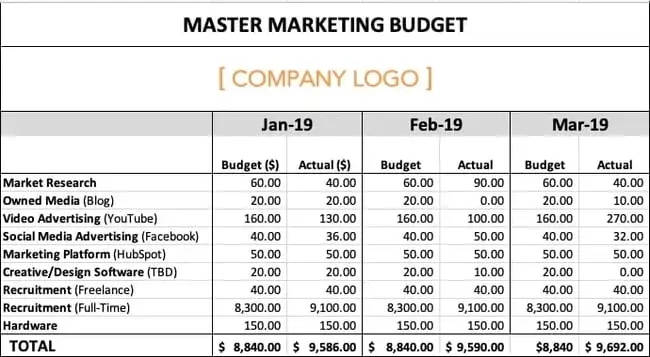
Based on the figures above, video advertising’s total expenses for the quarter exceeded budget by $20, while full-time recruitment’s total expenses exceeded budget by $2,400. This means the company is trending over budget for the first three months of the year.
Why might this happen? Perhaps a pay-per-click (PPC) campaign on YouTube received more clicks by viewers than expected, and a sharp, video-savvy job candidate negotiated a higher salary.
Based on the difference between this company's planned spend and actual spending, their budget template produced the following graph:
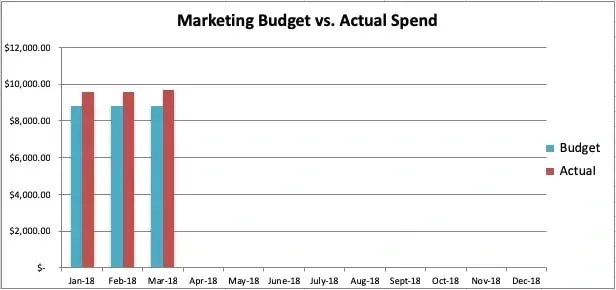
What to Include in an Ad Budget
Six costs form the core of effective ad budgets. Let me break down how I think about each one.

1. Internal Resources
When I plan for internal resources, I think beyond just headcount. I consider both the people and tools they need to succeed.
For example, my team‘s time spent on ad campaigns isn’t just about their salaries. It's about investing in their specialized training for new ad platforms, ensuring they have the right tools to work efficiently, and building in time for creative collaboration.
I've learned that underestimating these supporting costs can seriously impact campaign effectiveness.
.png)
8 Free Marketing Budget Templates
Free templates to manage your marketing spend across channels.
- Product marketing budget template
- Paid advertising budget template
- PR budget template
- And more!
Download Free
All fields are required.
.png)
2. Market Research
Market research has evolved far beyond simple surveys and focus groups. I invest in both ongoing customer feedback loops and broader market analysis.
This might mean running A/B tests on ad creative, analyzing competitor strategies, or using AI-powered tools to spot emerging trends. I've found that solid market research often pays for itself by preventing costly campaign mistakes.
3. Third-Party Providers
I approach agency and freelancer partnerships strategically. Rather than viewing them as just extra hands, I see them as specialists who can fill specific expertise gaps.
For instance, I might bring in a specialized agency for a product launch while keeping day-to-day ad management in-house. This flexible approach helps me scale efforts up or down as needed without maintaining a larger permanent team.
4. Asset Creation
The days of one-size-fits-all creativity are long gone. I budget for creating multiple versions of assets tailored to different platforms and audiences.
This includes variations for different screen sizes, platform-specific formats (think TikTok versus LinkedIn), and different stages of the customer journey.
I've learned that high-quality, platform-optimized creative often delivers better ROI than generic assets used everywhere.
5. Ad Space Spending
Ad space isn't just about buying impressions anymore. I allocate budget based on platform performance and audience behavior patterns.
This might mean investing heavily in search ads during peak shopping seasons or allocating more to social platforms during specific audience engagement times. The key is maintaining flexibility to shift spending based on real-time performance data.
6. Performance Evaluation
I've learned that performance evaluation needs its own dedicated budget. This covers not just analytics tools but also the resources needed to turn data into actionable insights.
I invest in tools that can track cross-channel attribution, measure brand lift, and calculate true ROAS (Return on Ad Spend). This helps me make data-driven decisions about where to invest more and where to pull back.
In my experience, the success of an advertising budget often depends on how well these six components work together rather than how much is spent on each individually.
Total up the cost of these six components to get your potential ad budget. If this is your first year creating an ad budget, set budget caps slightly higher than you anticipate. If you have previous years’ data on ad performance, use this information to help determine expected costs.
It’s also worth noting that ad budgets rarely remain on target as the cost of digital advertising space increases and customer expectations evolve.
As a result, it’s worth building in some extra budget room in case ads don’t live up to expectations or high-performing campaigns can benefit by increasing their reach.
How to Set and Monitor Your Ad Budget
Advertising budgets aren’t static. Instead, they change over time in response to business goals and consumer expectations.
To make the most of your ad budget, I think it’s important to both set a baseline and monitor metrics over time. Here’s what this looks like in practice.
Setting an Ad Budget
Follow three steps to set your basic ad budget.
Step 1: Decide on a strategy.
I always recommend starting with strategy before numbers. Too many teams jump straight to channel selection without considering their overall goals.
Before allocating a single dollar, I ask: Are we trying to enter a new market, defend our current position, or launch a new product? Each scenario requires a different approach to budget allocation.
For example, when I plan a new product launch, I typically allocate more budget to awareness and education channels. However, when I focus on market share growth, I might shift more resources to conversion-focused campaigns.
Pro tip: Meet customers where they are, not where you want them to be. If current strategies aren’t working and data tells you that customers have moved on, pack your bags and make the change.
Step 2: Select measurable goals.
Vague goals lead to vague results. When setting goals, make them specific and measurable.
Instead of saying, “increase brand awareness,” aim for specific targets like “achieve a 25% increase in branded search volume” or “reach a cost per qualified lead of $50 or less.”
What's crucial is connecting these goals to actual business outcomes. I make sure every metric I track ties back to revenue or strategic business objectives. This makes it much easier to justify budget adjustments when needed.
Pro tip: Pick just a few metrics to start. While more data provides more insight, doing too much too quickly can lead to information overload, increasing the risk that actionable data gets lost in the shuffle.
Step 3: Do your research.
Research isn't just a one-time activity before launching campaigns. I maintain ongoing research in three key areas:
- Competitive analysis. Understanding competitor spending patterns and channel preferences
- Customer behavior. Tracking changes in how our audience consumes media.
- Channel performance. Monitoring which platforms are delivering the best results for our industry.
Pro tip: Cast a wide net. Combine in-person interactions, online reviews, digital surveys, and customer service histories to better understand what customers want and whether you’re providing it. Equipped with strategies, goals, and data, you’re better positioned to create a realistic ad budget that will allow you to target the ideal audience and capture their interest.
Monitoring Your Budget
Keep your budget on track by monitoring three key metrics:
1. Return on Ad Spend (ROAS)
ROAS helps determine if your ads are generating sales or losing money.
To find ROAS, divide sales tied to ads by the cost of those ads.
For example, if your ads produced $1,000 worth of sales and cost $200, you divide $1,000 by $200 to get a ROAS of 5.
Higher ROAS values mean more performance for the cost. Values under 1 mean that ads cost more than the revenue they produce.
Pro tip: ROAS isn’t enough in isolation. While it shows the total value of ads compared to spending, it doesn’t tell you anything about customers themselves. If your goal is to encourage repeat purchases, ROAS can show you that ads are working, but it can’t tell you if the same customers are returning or if purchases are one-and-done.
2. Conversion Rate
Conversion rate measures how frequently customers take a specific action when they view an advertisement.
This action might be clicking on the ad to visit your website, clicking through to download a free ebook or other resource, or signing up for email newsletters.
To find the conversion rate of your ads (measured in a percentage), divide the total number of conversions by the total number of advertisement views, then multiply by 100.
Pro tip: Conversion rate is often the first metric to fall as advertisements lose efficacy. As a result, it’s worth measuring conversions weekly or bi-weekly to make necessary ad changes.
3. Cost per Lead (CPL)
Cost per lead offers a per-person look at ad spending.
This value is calculated by dividing the total amount spent on an advertisement by the total number of leads attributed to it.
While metrics like ROAS show sales related to ads, CPL shows the number of leads.
Consider a company that measures ad-attributed sales at $10,000 and ad spend at $1,000 for a stand-out ROAS of 10. The following month, however, sales plummeted. What’s going on?
CPL, meanwhile, shows just 20 leads for the ad, meaning that each lead cost $50. Without repeat spending the following months, the ad underperformed. As a result, it’s critical to measure both ROAS and CPL to get the big picture.
Pro tip: Companies can reduce their CPL by testing A/B ads before campaigns go live. The concept is simple: Test two (or more) ads in limited distribution to see which generates the most interest and leads.
Smart Marketing Budgets: Focus Your Spend, Fuel Your Growth
A smart marketing budget is your team’s roadmap to measurable success. Without a clear strategy, it’s easy to overspend on flashy campaigns that don’t move the needle or, worse, underinvest in the areas that truly drive growth.
That’s why I always return to the basics:
- Revisit the buyer’s journey.
- Sharpen my goals.
- Eliminate distractions so that every dollar has a real impact.
I focus on high-ROI initiatives, double down on what’s working, and resist the urge to chase trends that don’t align with my strategy.
Your budget isn’t just about numbers. It’s about where your brand is headed. Plan wisely, invest intentionally, and watch your marketing efforts translate into real, sustainable growth. Your team’s success depends on it.
Editor's Note: This blog post was originally published in March 2014 and has been updated for comprehensiveness.
.png)
8 Free Marketing Budget Templates
Free templates to manage your marketing spend across channels.
- Product marketing budget template
- Paid advertising budget template
- PR budget template
- And more!
Download Free
All fields are required.
.png)


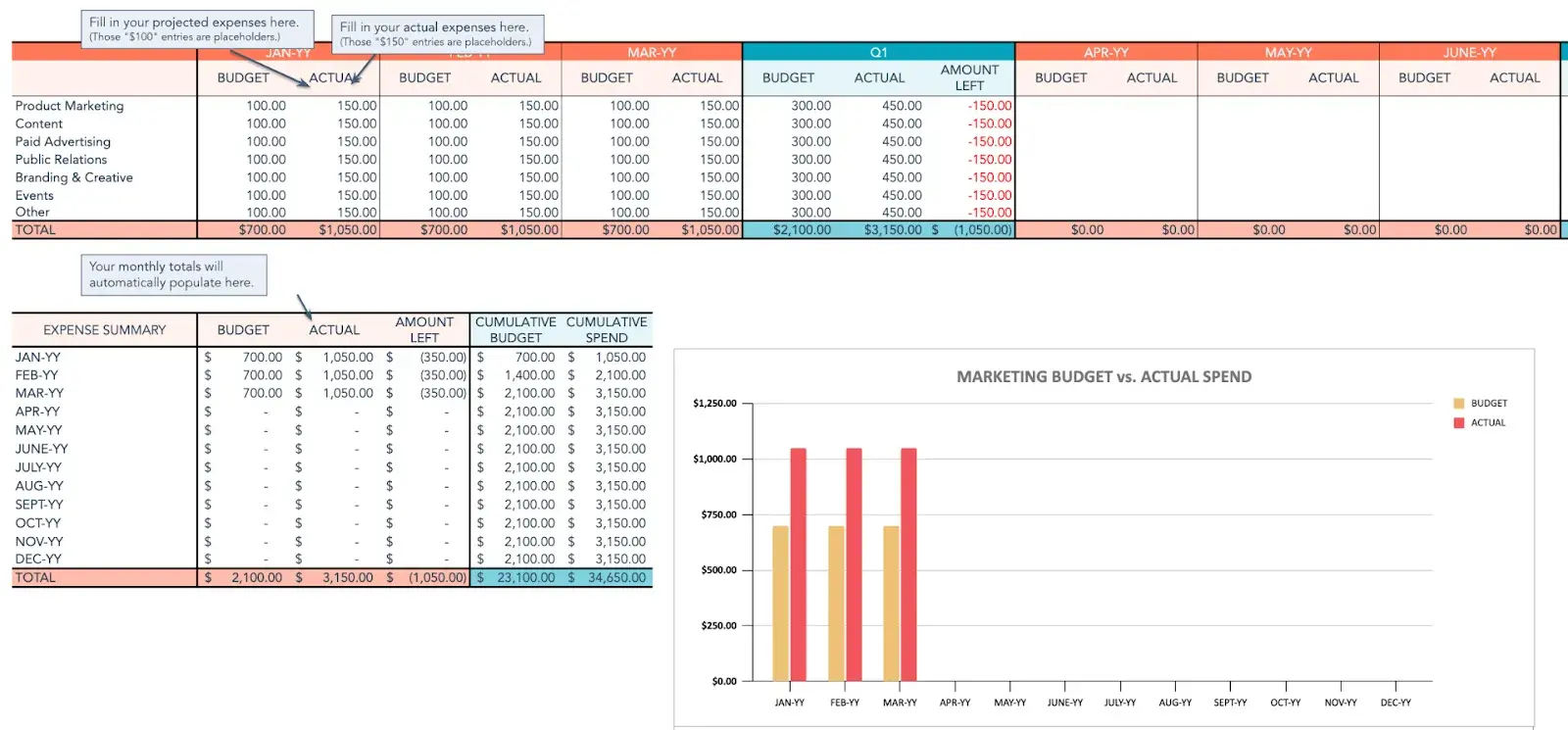
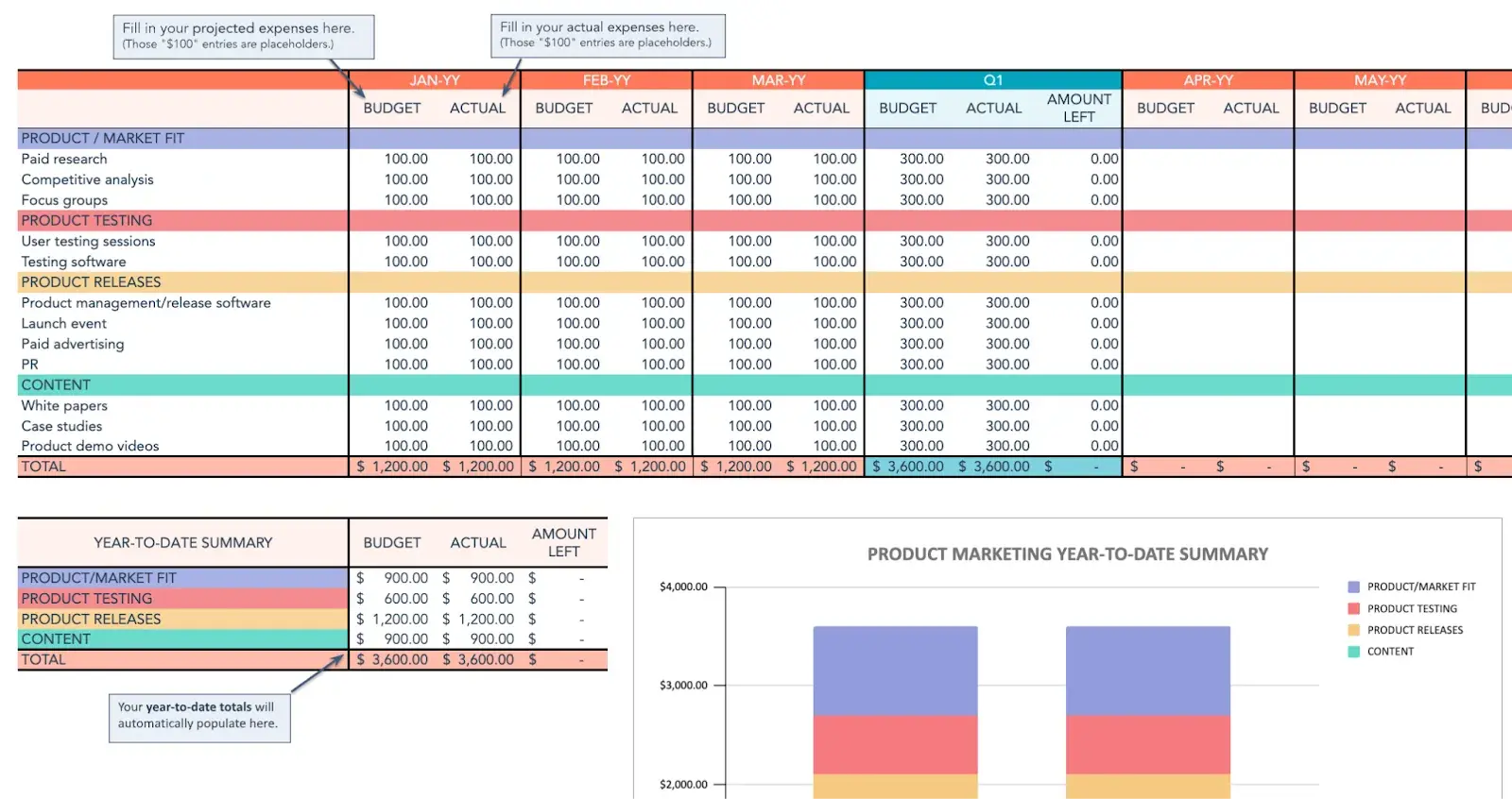
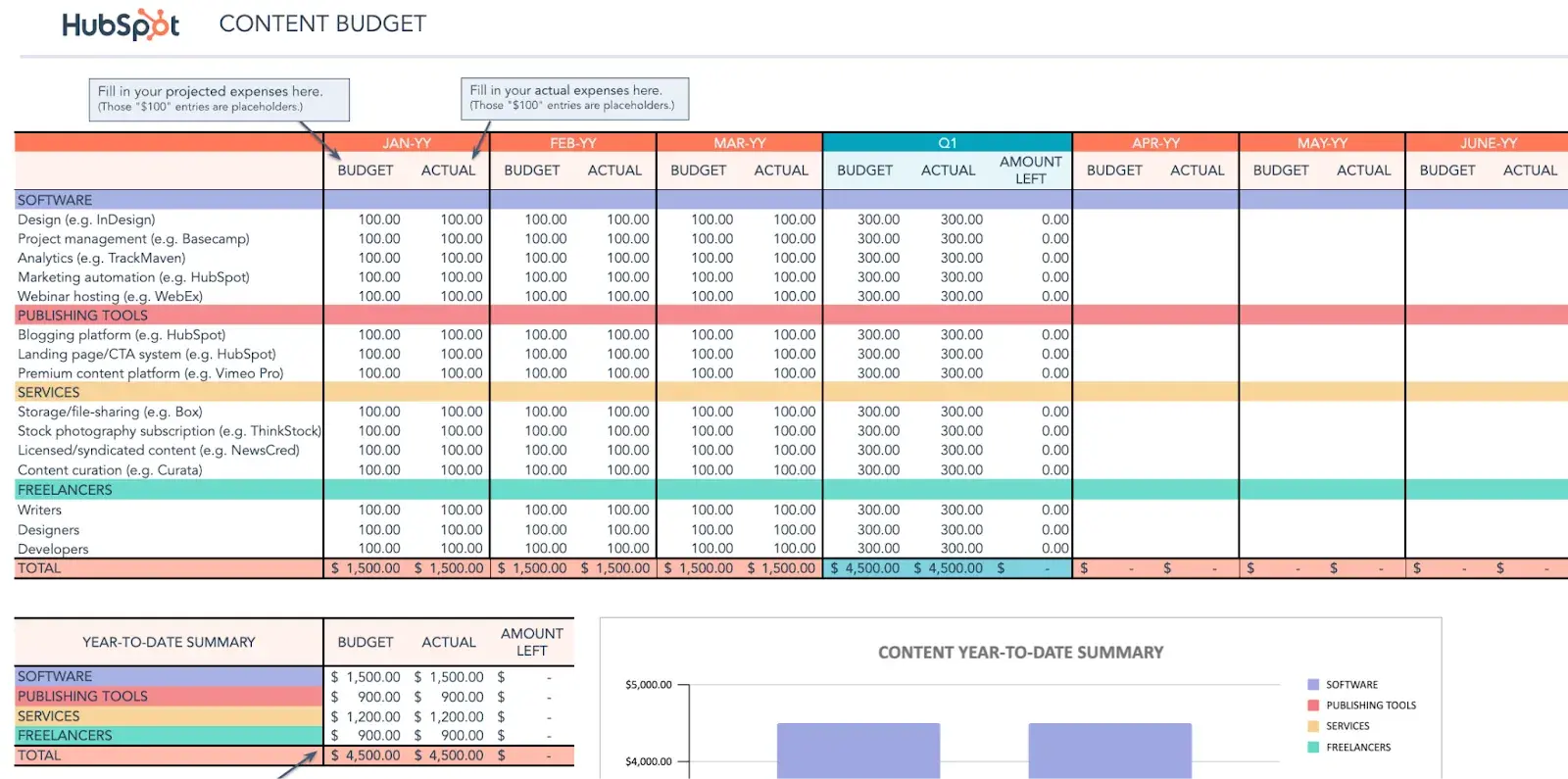
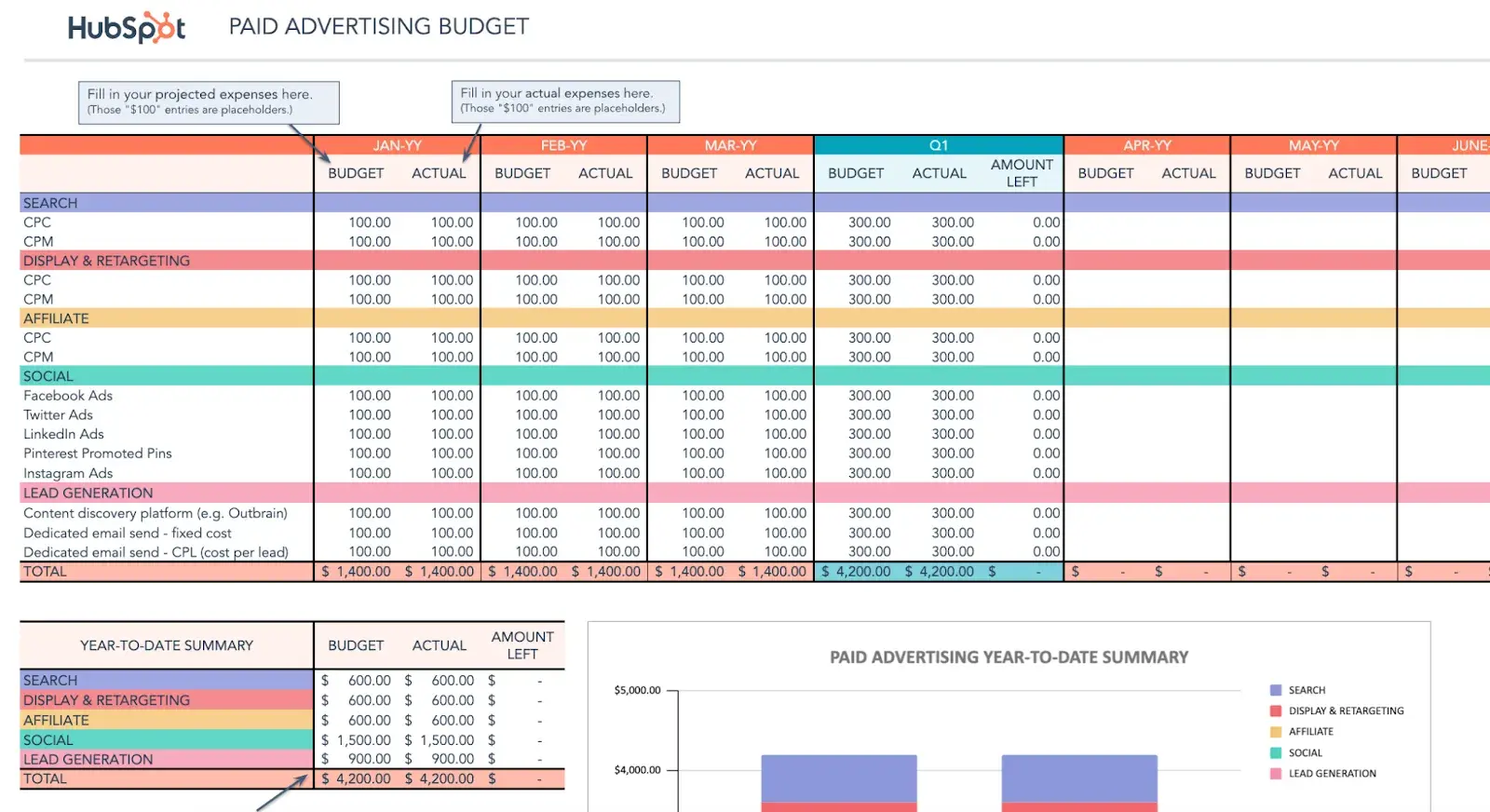
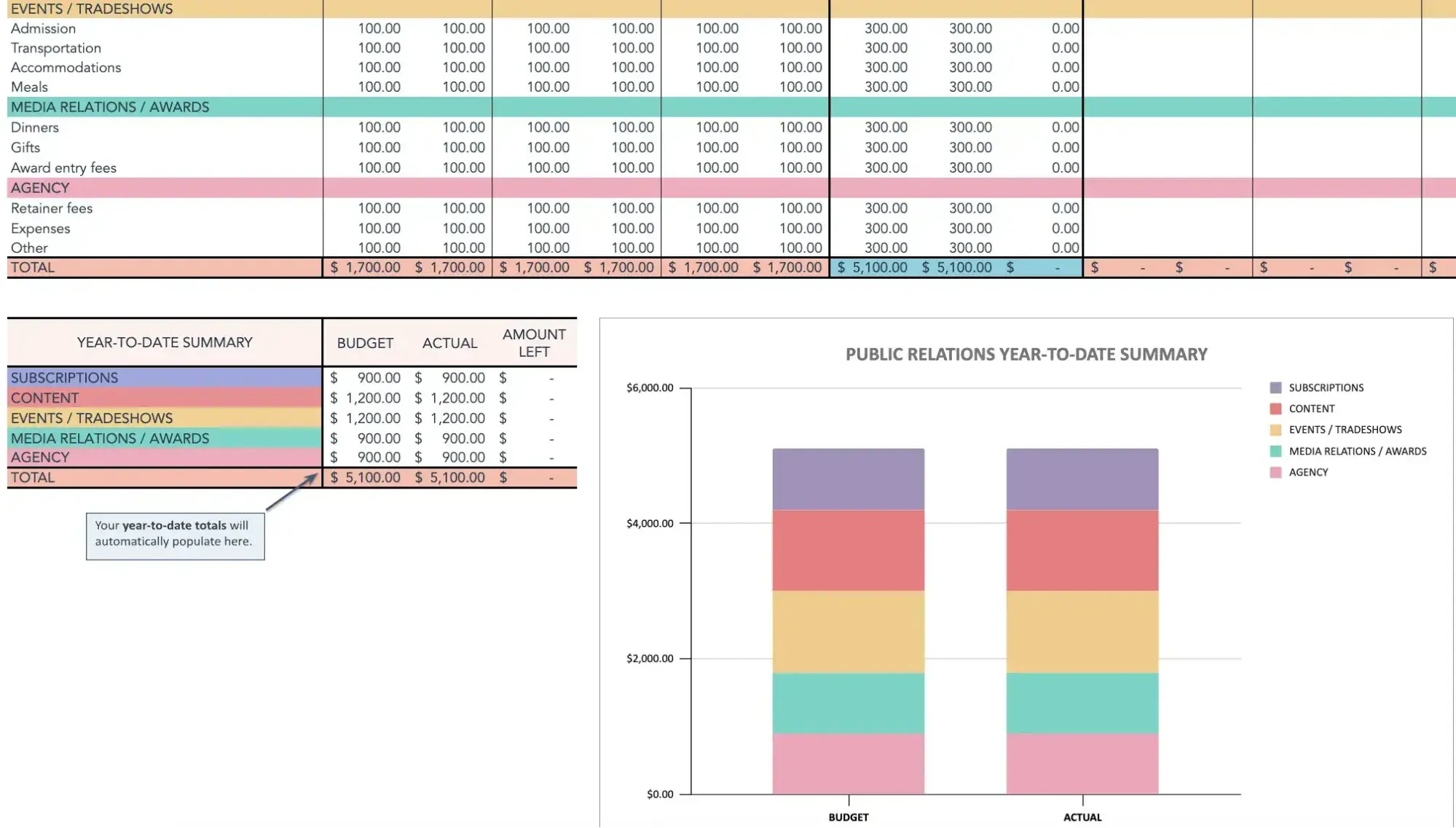
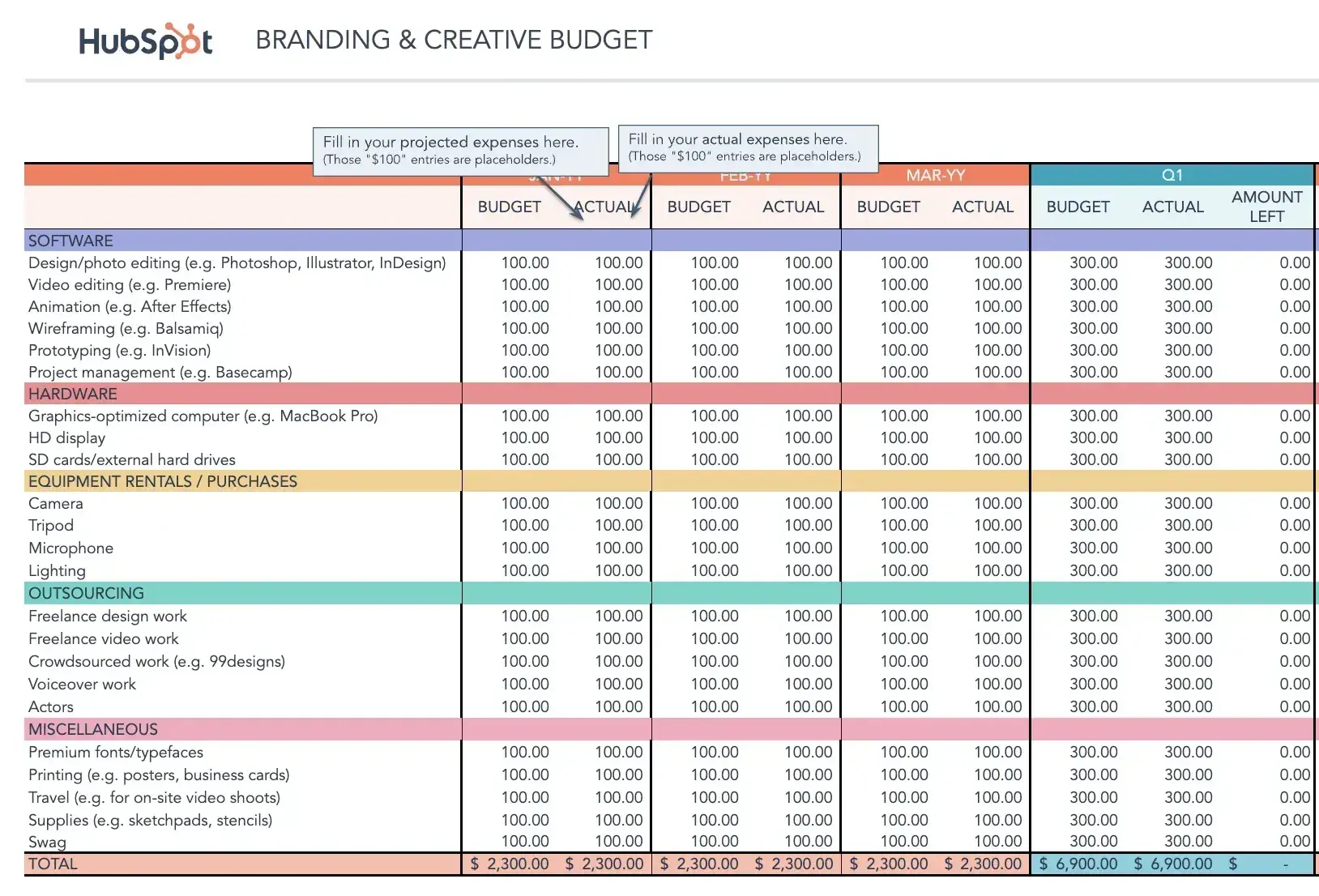
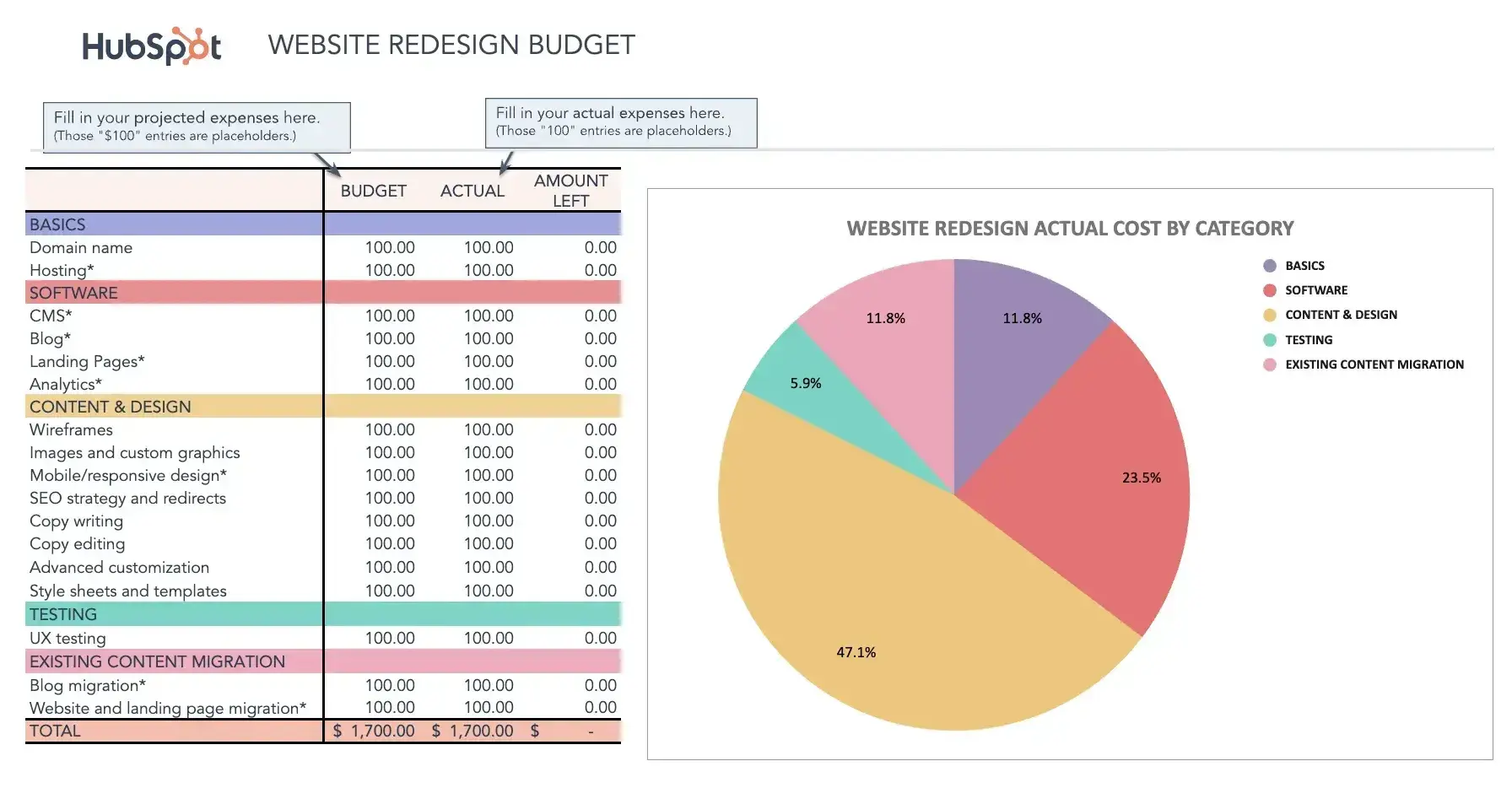
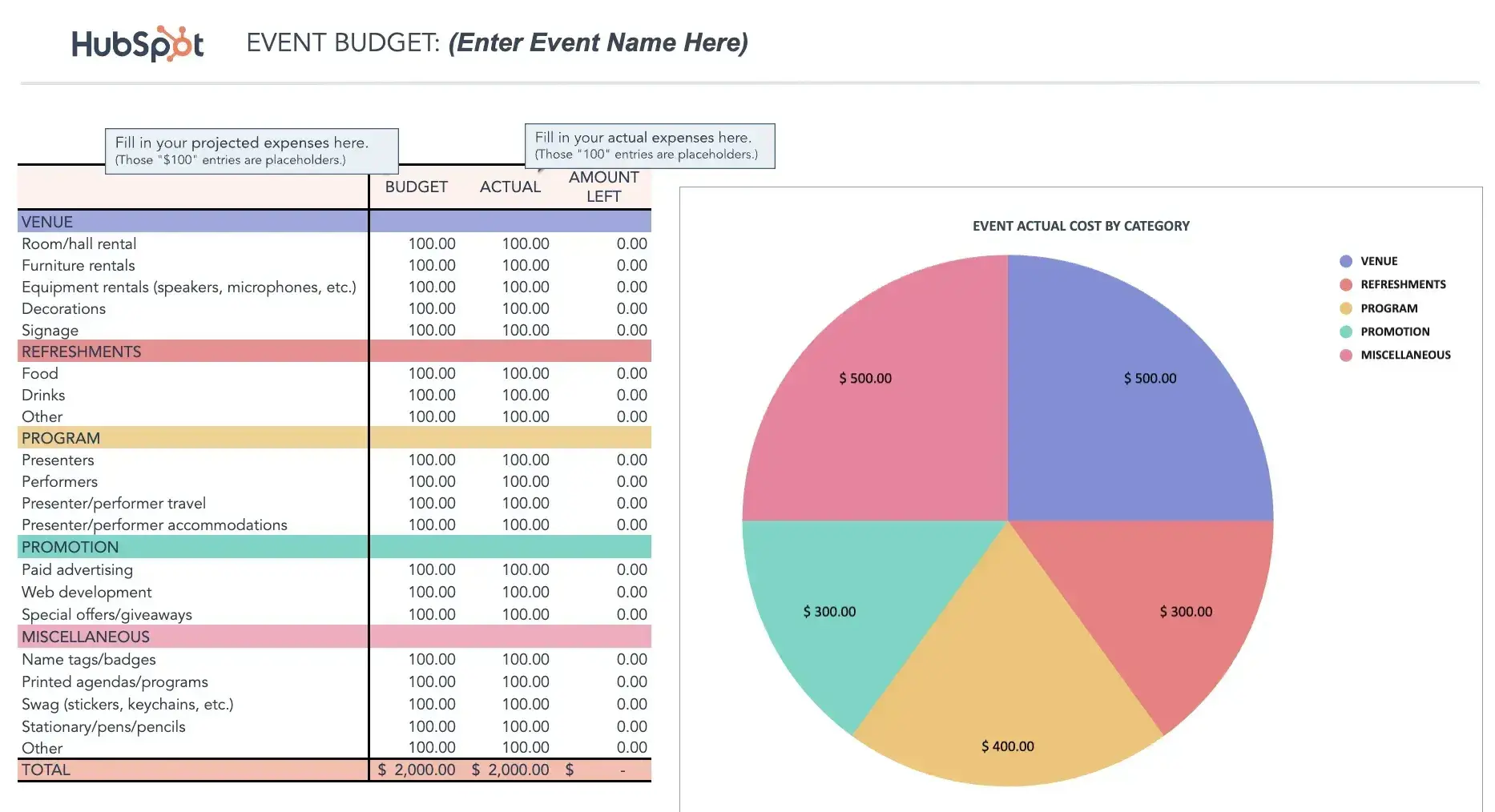
![Marketing Budget: How Much Should Your Team Spend in 2025? [By Industry]](https://www.hubspot.com/hubfs/how%20to%20spend%20your%20marketing%20budget_featured.webp)








